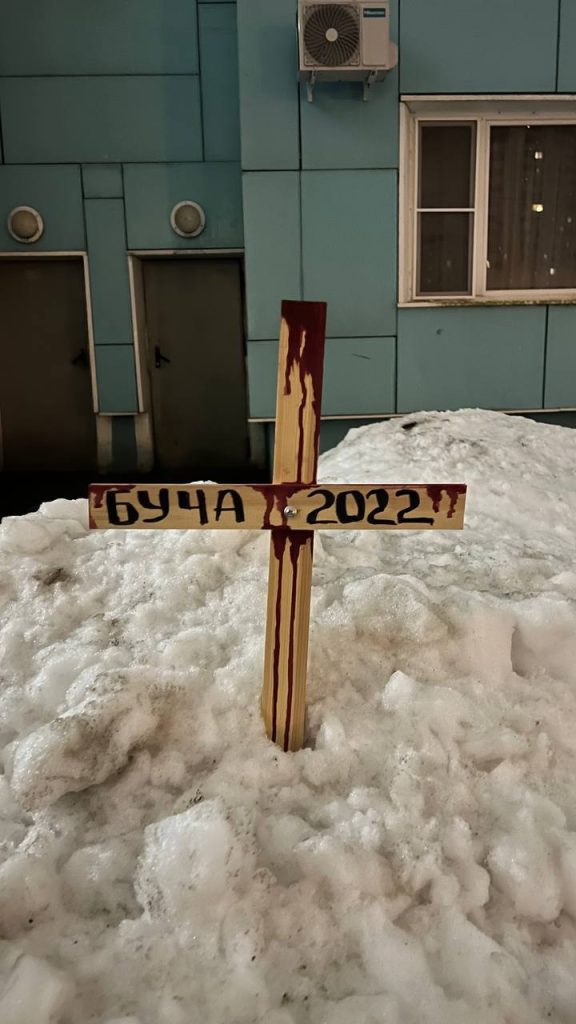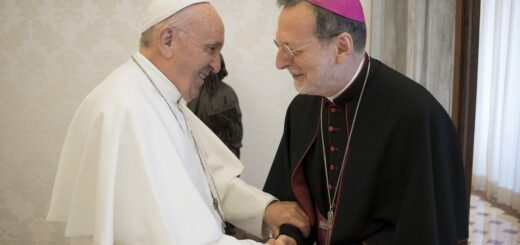How Russians are protesting the war in Ukraine from a totalitarian state
Sinds het begin van de Russische militaire invasie in Oekraïne hebben Russische burgers zich verzet tegen Poetins oorlog of wat officieel zelfs geen ‘oorlog’ mag heten. Ondanks de heersende censuur, de staatspropaganda en de forse boetes slagen mensen er toch nog in om op vaak subtiele manieren hun afkeer tegen de oorlog duidelijk te maken in het straatbeeld. Global Voices bracht een reeks foto’s bijeen van dit ‘stil’ protest.
Independent sources contributed photos of protest signs around Russia
Since Russia started its invasion of Ukraine, the regime has quickly morphed from a ‘hybrid’ authoritarianism into a totalitarian one. Independent Russian and Western media and social networking sites such as Meta, Twitter, and some others were blocked in order to promote ‘unified’ support towards the war and Russian dictator Vladimir Putin.
Throughout the country, a campaign was launched using Latin letter symbols Z and V to represent support for the war, which many observers say is a sign of increasing fascism. Russia’s use of the Z and V symbols has been prominent, with the V representing ‘victory’ in Putin’s military operation.
The character Z is not found in the Russian or Cyrillic alphabets, but is adapted from the Latin alphabet to mirror the pronunciation of the Russian word ‘за’, which means ‘for’. In the context of the war, it means ‘for the country’.
It is now illegal in Russia to call the war a ‘war’ or protest it in any way. Violators can face up to 15 years in jail. According to the Russian government Lexus, what is happening is a ‘military operation’.
Even people who go out on the streets with empty hands (pretending they hold a poster) have been detained. It is also prohibited to write anything anti-war in public spaces and on social media.
However, a lot of people in Russia continue to defy the authorities. Apart from individual protests when people oppose knowing in advance they would be detained, other forms of public dissent have emerged. People draw graffiti, leave objects on the streets, and find other ways to show their opposition under the constant threat of punishment.
The rare independent sources, for instance, student journal DOXA and the Telegram channel of journalist Roman Super, publish collections of protest photos every day showing readers that within Russian society there is more than the ‘unified’ around the lies of propaganda.

Global Voices, with the permission of the authors, is publishing a selection of photos of everyday forms of protesting from around the country:
Global Voices stands out as one of the earliest and strongest examples of how media committed to building community and defending human rights can positively influence how people experience events happening beyond their own communities and national borders.
Von der Schwierigkeit, nicht Töten zu wollen
Maksim und Mark sind zwei junge Kriegsdienstverweigerer aus Russland.
Vorausschauend haben sie Russland noch vor Kriegsbeginn und Einberufung verlassen, was ihnen nun zum Verhängnis wird, da sie nicht als Deserteure anerkannt werden. Connection e.V. begleitet und unterstützt die Beiden. Mit Mut und Offenheit geben sie Einblicke in ihre Lebensrealität. Der Bericht kann angesehen werden unter https://www.mdr.de/tv/programm/sendung-758642.html
Europe-wide call for protection and asylum for deserters and conscientious objectors from Russia, Belarus and Ukraine
Appeal to European Parliament and Parliamentary Assembly of Council of Europe https://en.connection-ev.org/article-3577
“They were furious”: the Russian soldiers refusing to fight in Ukraine
Lees verder (inhoud juni 2022)




